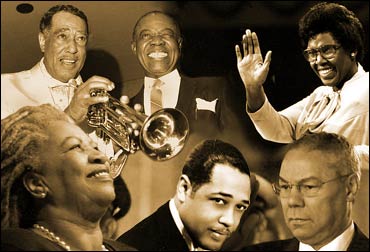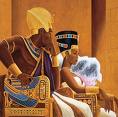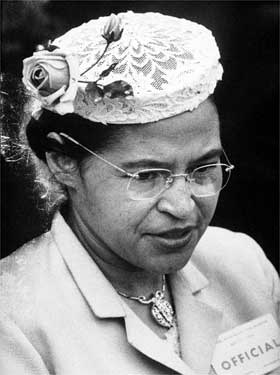









[edit] Lewis Woodson
Historian Floyd Miller wrote that Lewis Woodson utilized the pen name Augustine, and suggested that Woodson was the father of black nationalism.[1] During a four year period (1837-1841), as "Augustine," Woodson wrote a series of letters that were published in the Colored American newspaper. These letters advocated initiatives independent of the benevolence of whites to create institutions, including churches, newspapers, and schools. Woodson/Augustine advocated preparation for the time when the multitudes of American slaves would gain freedom, and require social, organizational, and financial assistance. Unlike most black abolitionists, who altered positions, Woodson never advocated emigration to Africa or a slave uprising. Woodson was ordained as an AME minister in Ohio in 1826. In 1830 he attended the first national convention of African American leaders in Philadelphia. He and Rev. Daniel Payne, two other black people and a group of white clergy formed the founding Board of Directors of Wilberforce University in 1856.
[edit] Marcus Garvey
Marcus Garvey encouraged black people around the world to be proud of their race and to see beauty in their own kind. A central idea to Garveyism was that black people in every part of the world were one people and they would never advance if they did not put aside their cultural and ethnic differences and unite. Black people, Garvey felt, should love and take care of other black people.
The principles of Garveyism are race first, self-reliance and nationhood. Race first is the idea that black people should support other black people first and foremost, self-reliance is the idea that black people should be politically and economically self-reliant (it was important to Garvey that black people develop businesses owned and operated by black people and that they patronize these businesses) and nationhood is the idea that black people should create a United States of Africa which would safeguard the interests of black people worldwide.
To disseminate the UNIA's program, Garvey founded the Negro World newspaper and to encourage black economic independence, he founded the Black Star Line in 1919 as well as the Negro Factories Corporation. The UNIA also initiated the Universal African Legion, a paramilitary group, the Black Cross Nurses, the African Black Cross Society and the Black Cross Trading and Navigation Corporation. Garvey attracted millions of supporters and claimed eleven million members for the UNIA. Marcus Garvey, however, did not advocate that all black people should leave the United States to emigrate to Africa (a strong United States of Africa would protect the interests of all black people everywhere in the world so a physical migration of all black people in the West was unnecessary and, in some cases, undesirable).
Although Marcus Garvey was an ardent supporter of racial separatism (he encouraged black people to separate themselves from whites residentially, develop their own all black businesses and schools, and preached against inter-racial marriage as 'race suicide'), he made it clear that he held no hostility towards whites and believed in the equality of all human beings. Garvey set the precedent for subsequent black nationalist and pan-Africanist thought including that of Kwame Nkrumah (and several other African leaders) the Nation of Islam, Malcolm X and most notably, Carlos Cooks (who is considered the ideological son of Marcus Garvey) and his African Nationalist Pioneer Movement.
Marcus Garvey's beliefs are articulated in The Philosophy and Opinions of Marcus Garvey as well as Message To The People: The Course of African Philosophy.
[edit] Malcolm X
Between 1953 and 1965, while most black leaders worked in the civil rights movement to integrate black people into mainstream American life, Malcolm X preached independence. He maintained that Western culture, and the Judeo-Christian religious traditions on which it is based, was inherently racist. Constantly ridiculing mainstream civil rights leader Dr. Martin Luther King, Jr., Malcolm X declared that nonviolence was the "philosophy of the fool". In response to Reverend King's famous "I Have a Dream" speech, Malcolm X quipped, "While King was having a dream, the rest of us Negroes are having a nightmare."
Malcolm X believed that black people must develop their own society and ethical values, including the self-help, community-based enterprises that the black Muslims supported. He also thought that African Americans should reject integration or cooperation with European Americans. Malcolm was increasingly moving towards a political response to racism, he called for a "black revolution," which he declared would be "bloody" and would renounce any sort of "compromise" with whites. After taking part in a Hajj (pilgrimage to Mecca), he recanted such extremist opinions in favor of mainstream Islam and socialism, and was soon after assassinated during a speech held at The Audubon Ballroom, NYC.
Upon his return from Mecca, Malcolm X abandoned his commitment to racial separatism; however, he was still in favour of black nationalism and advocated that black people in the U.S. be self-reliant. The beliefs of post-Mecca Malcolm X are articulated in the charter of his Organization of Afro-American Unity (a black nationalist group patterned after the Organization of African Unity).
[edit] Frantz Fanon
While in France Frantz Fanon wrote his first book, Black Skin, White Mask, an analysis of the impact of colonial subjugation on the black psyche. This book was a very personal account of Fanon’s experience being black: as a man, an intellectual, and a party to a French education. Although Fanon wrote the book while still in France, most of his other work was written while in North Africa (in particular Algeria). It was during this time that he produced his greatest works, A Dying Colonialism and perhaps the most important work on decolonization yet written, The Wretched of the Earth.. In it, Fanon lucidly analyzes the role of class, race, national culture and violence in the struggle for national liberation. In this seminal work Fanon expounded his views on the liberating role of violence for the colonized, as well as the general necessity of violence in the anti-colonial struggle. Both books firmly established Fanon in the eyes of much of the Third World as the leading anti-colonial thinker of the 20th century. In 1959 he compiled his essays on Algeria in a book called L'An Cinq: De la Révolution Algérienne.
[edit] Black Power
Black Power was a political movement expressing a new racial consciousness among black people in the United States in the 1960s and 1970s. Black Power represented both a conclusion to the decade's civil rights movement and an alternative means of combatting the racism that persisted despite the efforts of black activists during the early 1960s. The meaning of Black Power was debated vigorously while the movement was in progress. To some it represented African-Americans' insistence on racial dignity and self-reliance, which was usually interpreted as economic and political independence, as well as freedom from European American authority. These themes had been advanced most forcefully in the early 1960s by Malcolm X. He argued that black people should focus on improving their own communities, rather than striving for complete integration, and that black people had a duty to retaliate against violent assaults. The publication of The Autobiography of Malcolm X (1965) created further support for the idea of African-American self-determination and had a strong influence on the emerging leaders of the Black Power movement. Other interpreters of Black Power emphasized the cultural heritage of black people, especially the African roots of their identity. This view encouraged study and celebration of black history and culture. In the late 1960s black college students requested curricula in African-American studies that explored their distinctive culture and history. Still another view of black Power called for a revolutionary political struggle to reject racism and economic exploitation in the United States and abroad, as well as colonialism. This interpretation encouraged the alliance of non-whites, including Hispanics and Asians, to improve the quality of their lives.
[edit] Uhuru Movement
The Uhuru Movement is the largest contemporary black movement advocating black nationalism. It was founded in the 1980s in St. Petersburg, Florida. Composed mainly of the African People's Socialist Party, the Uhuru Movement also includes other organizations based in both Africa and the United States. These organizations are in the process of establishing a broader organization called the African Socialist International.